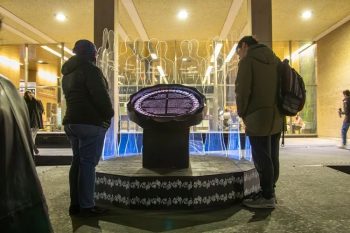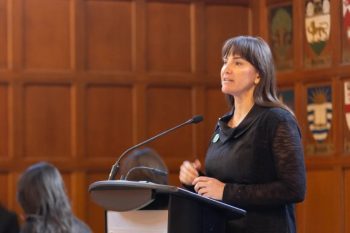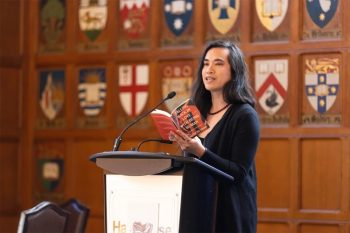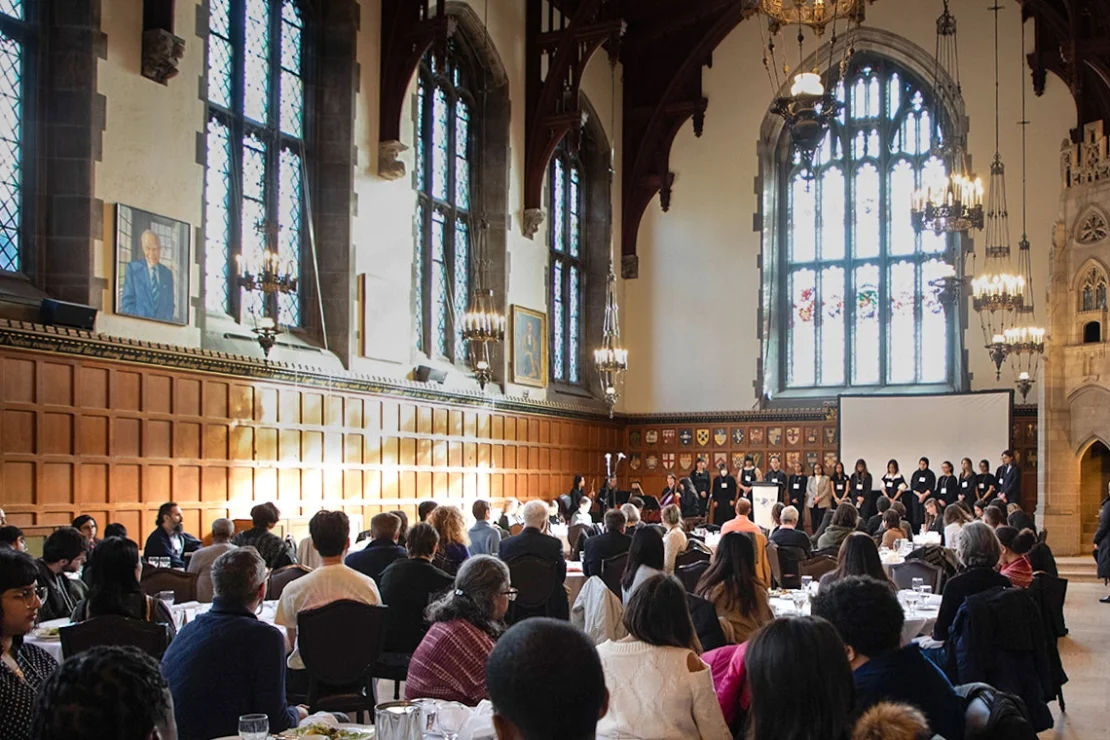The University of Toronto community came together to honour the memories of the 14 women who were killed in the École Polytechnique massacre in 1989 and to acknowledge the ongoing struggle against gender-based violence.
In-person and online, students, faculty, staff, librarians and alumni across the three campuses marked the National Day of Remembrance and Action on Violence Against Women with a memorial, led by the Faculty of Applied Science & Engineering, that was held at Hart House on Wednesday — the 34th anniversary of the anti-feminist attack that claimed the lives of 14 women and left another 10 women and four men injured.
Students walked across the stage to say the name of each woman killed — Geneviève Bergeron, Hélène Colgan, Nathalie Croteau, Barbara Daigneault, Anne-Marie Edward, Maud Haviernick, Barbara Klucznik-Widajewicz, Maryse Laganière, Maryse Leclair, Anne-Marie Lemay, Sonia Pelletier, Michèle Richard, Annie St-Arneault and Annie Turcotte — followed by a moment of silence.
Separately, a group of women in the Faculty of Applied Science & Engineering prepared to unveil a student-led monument outside the Galbraith Building. The installation, led by Rebecca Ing (Year 3 MSE), Kaija Mikes (Year 3 EngSci), Natalia Espinosa-Merlano (Year 4 MechE) and Erika Narimatsu (Year 4 MechE) with the support of more than a dozen volunteers, features 14 figures in a circle with a plaque that explains its meaning.

Ing said the National Day of Remembrance and Action on Violence Against Women is of particular importance to her, as a woman in engineering.
“I see myself reflected in the women we are remembering, as I attend classes that they once learned from,” Ing said. “To remember them and the gender-based violence that took their lives is not an option: it is our responsibility as students to encourage action and awareness to improve inclusion.”

Back at the Hart House event, Toronto Mayor Olivia Chow appealed to the U of T community to heed the call she recalled seeing on a sign during a Dec. 6, 1989 vigil outside of Emmanuel College: “We mourn, then we work for change.”
“Every one of you are change-makers and change leaders, because you’re here at the University of Toronto,” Chow said. “You get the best education. You have the confidence — you have the skills — to know what needs to be done. So today, I urge you to make a commitment to put your passion and your intellect into it.”

Marisa Sterling, the assistant dean and director, diversity, inclusion and professionalism at U of T Engineering, said that while positive change has been made in the decades since the tragedy, women in engineering continue to face gender-based violence and harassment, along with other forms of discrimination.
“Until violence against women has been eradicated, we will remember these 14 women and their families and bring awareness for the need for further actions every year,” Sterling said. “The eradication of gender-based violence and all forms of oppression is collective work.”

The event featured a keynote speech by author, performer and somatic sex educator Kai Cheng Thom — titled “Care, Healing, and Justice: Addressing Transmisogyny and Ending Gender-Based Violence for All” — and a musical performance.
Thom urged attendees to hold fast to the ideals of empathy and solidarity amid the rising threat of violence.
“The valley of fear threatens to swallow us whole, but the light of love moves within and between us — if only we let it,” Thom said. “The moment we begin to act as though a better world is possible is the moment that starts to be true.”
Sandy Welsh, vice-provost, students, announced this year’s winners of the Award for Scholarly Achievement in the Area of Gender-Based Violence, which recognizes U of T students for their exceptional commitment to issues of violence against women, girls, transgender and non-binary people.
The undergraduate recipient was Gabrielle Tavazzani, a third-year student specializing in bioethics in the Faculty of Arts & Science, who was recognized for her work and research efforts on providing pro-bono dental care to survivors of gender-based violence.
The graduate winner was Nil Basduraka, a PhD candidate in the Faculty of Music. She was honoured for her interdisciplinary research examining media surrounding violence against women in Türkiye.
Wednesday’s hybrid event at Hart House was co-hosted by the Anti-Racism and Cultural Diversity Office; the Community Safety Office; the Equity, Diversity & Inclusion Office at U of T Mississauga; the Equity, Diversity & Inclusion Office at U of T Scarborough; the Faculty of Applied Science & Engineering; Hart House; the Division of People Strategy, Equity, & Culture; the Institutional Equity Office; the Sexual & Gender Diversity Office; and the Sexual Violence Prevention & Support Centre.
Kelly Hannah-Moffat, vice-president, people strategy, equity and culture, underscored the importance of providing opportunities for the community to engage with issues of gender-based violence and how it intersects with prejudices including transphobia and misogyny.
“Ending gender-based violence is possible through widespread, consistent, and ongoing action,” Hannah-Moffat said in a statement. “We can realize this possibility at the University of Toronto, one action at a time.”




